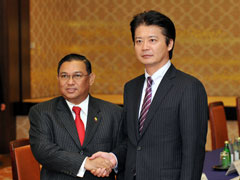(Mizzima) - Japanese Foreign Minister Koichiro Gemba arrived in Burma on Sunday, as Japan considers resuming official economic development to the country that is struggling to emerge from decades of military rule.
 Gemba's visit, the first by a Japanese foreign minister since 2002, comes as part of international efforts to engage Burma's new military-backed civilian government.
Gemba's visit, the first by a Japanese foreign minister since 2002, comes as part of international efforts to engage Burma's new military-backed civilian government.
The foreign minister will try to increase the momentum of reforms started by President Thein Sein since he took office nine months ago.
In the latest series of diplomatic overtures by major countries, Gemba will underscore Japan's readiness to assist Burma’s transformation into a democratic country and reduce poverty, especially in rural areas, according to an article in the Mainichi Daily News on Sunday.
After meeting separately with Thein Sein and Foreign Minister Wunna Maung Lwin in Naypyitaw, Gemba will hold talks with opposition leader and Nobel peace laureate Aung San Suu Kyi on Monday evening at her home in Rangoon, where she spent much of the last 21 years in confinement before being freed in November 2010.
Gemba will urge Burma’s leaders to make more progress on the fledgling reforms that have seen the new nominally civilian government release some political prisoners, and ease restrictions on the media and business, the newspaper said.
Suu Kyi's National League for Democracy, which formally registered as a political party last Friday, will aim to win all vacant seats in a by – election, to be held as early as in March.
In November 2010, the Southeast Asian country held its first general election in 20 years, which Suu Kyi's party boycotted and critics condemned as a sham. Since then, her party, the National League for Democracy, has filed for registration as a political party and will content in the next by-election, which could be held as early as late March.
A week after the abrupt announcement of North Korean leader Kim Jong Il's death, he will also press Thein Sein, a former general and prime minister, and Wunna Maung Lwin to break off military and suspected nuclear links with Pyongyang, the newspaper said.
Unlike the United States and Europe, Japan has maintained trade ties with Burma, and did not impose sanctions on one of Asia's most impoverished countries even at the time of its long military rule.
The newspaper said the policy was designed to avoid isolating Burma from the international community.
Still, Japan stopped carrying out new economic development projects from 2003 in the wake of the detention again of Suu Kyi, with the exception of necessary humanitarian aid and some limited technical cooperation.
In an attempt to make the steps toward democracy irreversible, Japan has recently launched bilateral consultations on economic cooperation, suggesting that it is prepared to consider the resumption of yen loans for development projects, including repair to a major hydropower dam which it originally helped to finance.
During the latest talks, however, the newspaper said Gemba will not pledge any financial aid package. Japanese officials said that Burma still has a long way to improve its governance and find ways to repay its sizable debt to Japan and multilateral institutions.


